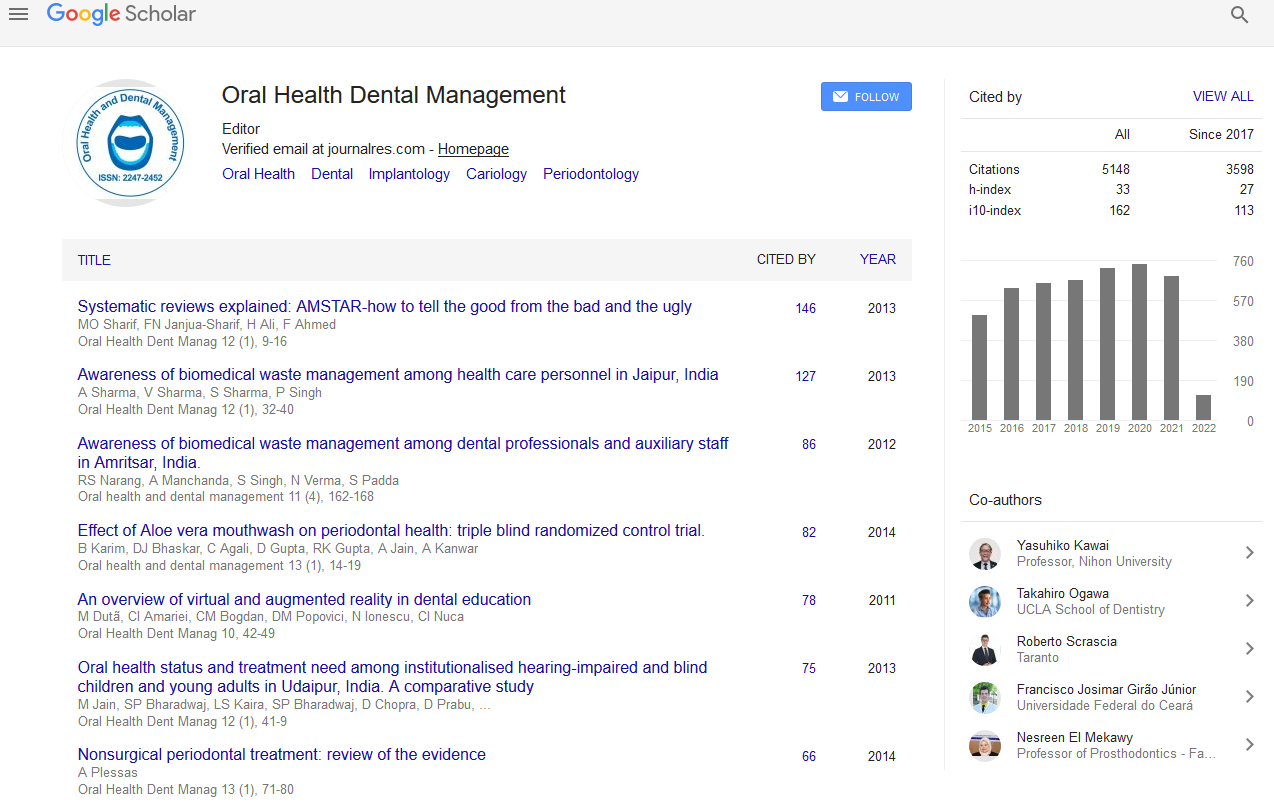Indexed In
- The Global Impact Factor (GIF)
- CiteFactor
- Electronic Journals Library
- RefSeek
- Hamdard University
- EBSCO A-Z
- Virtual Library of Biology (vifabio)
- International committee of medical journals editors (ICMJE)
- Google Scholar
Useful Links
Share This Page
Journal Flyer

Open Access Journals
- Agri and Aquaculture
- Biochemistry
- Bioinformatics & Systems Biology
- Business & Management
- Chemistry
- Clinical Sciences
- Engineering
- Food & Nutrition
- General Science
- Genetics & Molecular Biology
- Immunology & Microbiology
- Medical Sciences
- Neuroscience & Psychology
- Nursing & Health Care
- Pharmaceutical Sciences
A case of pemphigus vulgaris developing neuropathic pain
4th Asia Pacific Congress & Expo on Dental and Oral Health
July 27-29, 2015 Brisbane, Australia
Emad M Hadlaq and Mahnaz Fatahzadeh
Posters-Accepted Abstracts: Oral Health Dent Manag
Abstract:
Background: Pemphigus vulgaris (PV) is an uncommon, mucocutaneous, blistering disease of autoimmune etiology. Majority of cases first appear in the oral cavity whose diagnosis relies on histopathology and immunofluorescence studies. Corticosteroids and immunomodulators are the mainstays of treatment. We describe a patient with oral pemphigus vulgaris who developed burning mouth and taste alteration during the course of his disease. The possible association is discussed. Case Summary: A 73 year old male with previously diagnosed pemphigus vulgaris presented with an oral flare up to the oral medicine clinic for management. His past medical history included Diabetes type II, Hypercholesterolemia, Arthritis and Hypertension. His medications included Metformin, Rosiglitazone, Atrovastatin, Alendronate, and Losartan-hydrochloro thiazide combination. He was placed on systemic steroids and Dexamethasone oral rinse. Prednisone was tapered and recalcitrant lesions were injected with Kenalog suspension. Two months later, the patient developed oral burning and bitter metallic taste which did not respond to discontinuation of topical and intralesional steroids. The patient was diagnosed with phantom taste and started on clonazepam. Over time, dysguesia improved by 50%; residual symptoms resolved when patient placed on Pregabalin by his neurologist to treat chronic pain in his right leg. Conclusion: The etiology of patient?s oral symptoms is unclear. Oral complaints may represent previously reported side effects of steroids used in the management of pemphigus or may be neuropathic in nature. The oral neuropathy may be related to poor glycemic control; however, patient?s diabetes was well-controlled. Studies have suggested that neuritis is sufficient to induce altered nerve function. It is also possible that oral lesions of pemphigus induced perineural inflammation of the cranial nerves supplying the area and triggered neural fault. The resolution of oral symptoms with Clonazepam and Pregabalin support a neuropathic etiology.

